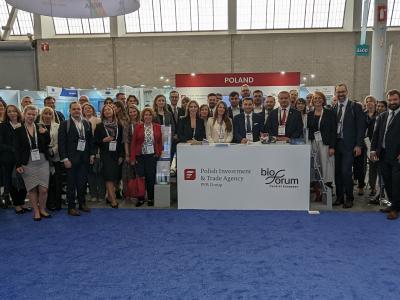2022 - the Year of Medical Biotechnology
2022 was a breakthrough year for the medical biotechnology industry. For the first time in history, this sector has been noticed on a larger scale by the ruling authorities and recognized as a strategic segment that can improve the competitiveness of the Polish economy. Due to the post-pandemic economic consequences and the unstable geopolitical situation, this was also a year full of challenges for the industry. Despite this, Polish companies have not given up in their efforts to develop new drugs and therapies to meet unsatisfied medical needs. The companies have also managed to carry out several significant business transactions, which have further highlighted the presence of the Polish medical biotechnology sector in the international value chain.
In June 2022, the Government Development Plan for the Biomedical Sector for the period 2022-2031 was adopted, which is a bold strategy aimed at permanently inserting our country into the global medical innovation bloodstream. As part of the program implementation, the first competitions were launched in the autumn, aimed at providing financial support for projects in the area of new drugs and new therapies in the field of protein preparations, cell therapies, as well as nucleic acids and small molecule drugs. So far, 7 projects have been recommended for funding with an allocation of almost PLN 170 million. Recruitment in the second of the competitions related to the development of innovative original drugs will end at the end of February 2023.
The development of projects in the area of "large" innovations on a transnational scale of novelty, such as new therapies and new diagnostic methods that allow for more effective fighting for the lives and health of patients, can improve the country's health security in the long term and contribute to increased availability of innovative therapies. This is undoubtedly a significant opportunity for strengthening Poland's scientific and economic potential in the coming decades.
War in Ukraine and Post-COVID Economic Challenges
The galloping inflation combined with the rise in energy, goods and services prices had a significant impact on the burden of the sector. Due to the increase in prices, the purchasing power of the grants awarded in previous years from European funds under the PO IR has significantly decreased, which has affected the revision of plans in the R&D projects.
The geopolitical situation and challenges associated with the pandemic have also caused delays in many projects. Increased sickness of employees with advanced, often niche competencies, which cannot be easily replaced, problems with supply chains and extended waiting times for, among others, reagents, laboratory equipment, and slowed recruitment of patients for clinical trials have meant that a large part of prospective projects will not be able to be completed within the European Union's deadline for the completion of R&D work under the ending EU funding perspective, i.e. by the end of 2023. For this reason, BioInMed has repeatedly appealed to decision-makers at both the national and EU level to develop solutions that will prevent the closure of valuable projects aimed at developing new therapeutic technologies solely due to expiring deadlines.
"We are pleased with the declaration of the Ministry of Funds and Regional Development that it will be possible to phase projects and transfer part of the work to the new financial perspective. If only the National Centre for Research and Development quickly processes this scheme with beneficiaries, there is hope that the projects that have been running for several years will not be wasted, in which successive milestones are successfully achieved", emphasizes Marta Winiarska, President of the Polish Association of Innovative Medical Biotechnology Companies BioInMed.
The geopolitical situation and global economic challenges also had a significant impact on the capital market. After the Covid-induced boom in medical biotechnology, companies from this sector have seen significant declines on the stock exchange. The situation beyond our eastern border and the threat of recession, despite many business successes of companies, caused a retreat of many investors from growth sectors, in favor of traditional industries with lower investment risk.
Milestones and Significant Transactions Despite Challenges
Despite a difficult, challenging year, companies in the medical biotechnology sector have continuously conducted their research and development projects aiming at developing new drugs, therapies and diagnostic methods. Some companies have completed preclinical development and have planned, and even obtained regulatory approval to commence clinical trials (including Poltreg, Molecure, Pure Biologics, JJP Biologics, and Captor Therapeutics), while others have received positive data from clinical trials already underway (such as Ryvu, WPD Pharmaceuticals, and Celon Pharma), allowing for planning of subsequent phases. The registration of the first Polish biopharmaceutical by the American Food and Drug Administration (FDA) is also certainly noteworthy.
In 2022, there were also significant multi-million dollar business transactions, including the sale of companies and inventions (e.g. Blirt's agreement with QIAGEN, or Scope Fluidics/Curiosity Diagnostics with American Bio-Rad Laboratories), licensing of Polish patented technologies (e.g. Ryvu's agreement with American Excilis, or Pure Biologics with Novaptech), as well as the establishment of research collaborations for the development of new drugs (e.g. Ryvu with German BioNTech, or Captor with Japanese Ono Pharmaceutical). Interestingly, foreign investors valued Polish companies much better than investors on the domestic stock exchange. Polish medical biotechnology has also been noticed and funded by the Bill and Melinda Gates Foundation (ExploRNA Therapeutics).
2023 – International Highlights and New Development Impulses
The new year brings another impulse for the sector in the form of a new EU funding perspective and the European Funds for a Modern Economy program. According to the Government's announcements, the application process will start in the first quarter of 2023. Additionally, if the funds from the National Recovery Plan are successfully launched, it will also be possible to launch new competitions by the Medical Research Agency and to co-finance projects for the development of new drugs - first and best in their class, which will allow to respond to unmet health needs.
Certainly, an essential element in integrating Polish medical biotechnology into the global value chain will be the presentation of Polish potential on the international stage. In cooperation with responsible Ministries, Government Agencies, and Embassies, BioInMed plans to showcase Polish medical biotechnology, among others, on the American, Israeli, and United Arab Emirates markets.
"There is no doubt that medical biotechnology has firmly established itself in the consciousness of Polish decision-makers as a strategic area and national good. We have a real chance to witness the creation of the first Polish original drug and a breakthrough in terms of both the Polish economy and medical progress." – emphasizes Marta Winiarska.



